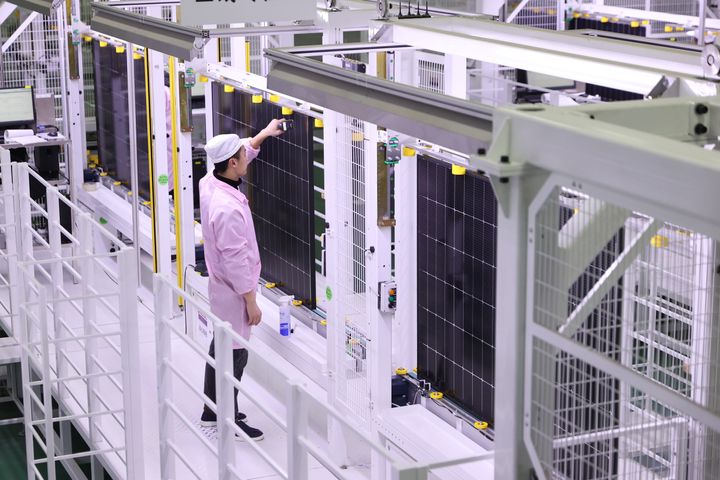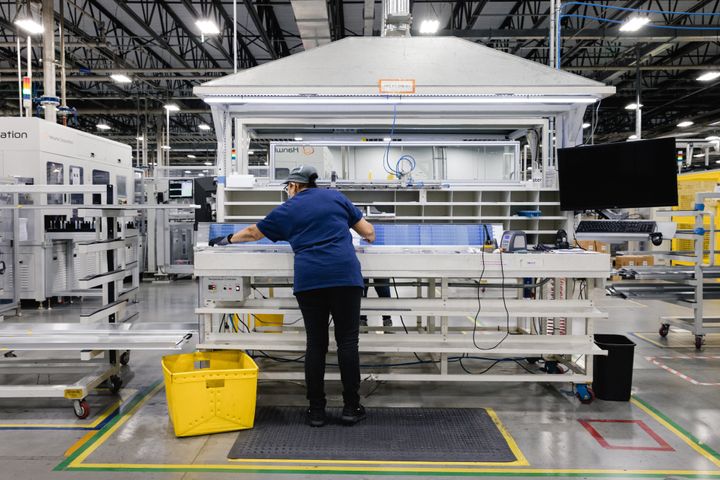President Joe Biden netted billions in his landmark climate-spending law to revive solar manufacturing in the United States — prompting the Korean panel giant Qcells last year to invest $2.5 billion into building the country’s largest photovoltaic factory in Georgia.
As the assembly line revs up this month, so does the federal government’s support.
Last Wednesday, Biden signaled plans to fulfill a U.S. solar manufacturers’ request to bring the full force of American trade restrictions down on imported Chinese panels. Last Friday, the administration announced a $255 million loan to a company promising to open in Tennessee one of the first factories outside China in years to make polysilicon for solar equipment. On Monday, the White House launched a $7 billion “solar for all” program meant to help build 1 million individual systems across the country.
Yet solar manufacturers say it’s not enough to keep American factories open in the face of a massive influx of panels so cheap that some buyers are using the equipment to make garden fences. Blaming illegal subsidies in China for artificially lowering the price of panels, Qcells and at least six other U.S. solar manufacturers filed a petition Wednesday urging the federal government to crack down.
The filing asks the Commerce Department and the U.S. International Trade Commission to investigate whether panel producers in Cambodia, Malaysia, Thailand and Vietnam are violating U.S. trade laws against subsidizing exports and selling solar equipment for below cost.
“China and Chinese-owned companies are manipulating our market,” Tim Brightbill, the trade lawyer representing the American Alliance for Solar Manufacturing, said on a call with reporters Tuesday night. “Chinese companies went from producing less than 2% of global solar production in 2004 to near-total market domination today.”

U.S. trade tariffs already raise the price of Chinese-made solar and ban imports of panels produced with materials traced back to Xinjiang, where the government in Beijing has reportedly forced minority Uighur Muslims to work for free in prison camps.
But the American companies allege that Chinese firms circumvented key restrictions by funneling products made in China by firms headquartered in the People’s Republic through the four Southeast Asian nations. The U.S. firms include Conval Energy, First Solar, Meyer Burger, Mission Solar, Qcells, REC Silicon, and Swift Solar, though Wiley Rein, the Washington, D.C., law firm handling the case, said it expects more to join in the coming days.
U.S. government scientists invented solar panels more than half a century ago, and the country monopolized manufacturing for decades. But production shifted to Europe and Asia in the 1980s. By the early 2010s, China vaulted forward to become the dominant supplier. Backed by low-interest state-backed loans, Chinese manufacturers drove down the price of panels below the point at which any U.S. company could make money.
Solar factories in the U.S. and Europe started closing at such a rapid clip, regulators on both continents accused China of violating international trade rules and slapped tariffs on imports. The restrictions helped U.S. manufacturers reclaim part of the higher-end rooftop solar market. While former President Donald Trump ratcheted up trade levies, he initially gave an exemption for the lower-quality “bifacial” panels on which utility-scale solar farms rely. The Republican revoked that exemption in 2020. Biden restored the waiver a year later. But in the face of record-low panel prices and government support so generous that Chinese dairy producers are getting into the solar-manufacturing business, the Democrat now looks poised to follow his predecessor’s strategy.
“In the past, we’ve been dependent on foreign oil from our adversaries. We should not make the same mistake with solar power,” Brightbill said. “Solar was invented here. It was perfected here. There’s no reason the U.S. should be dependent on Chinese companies.”
Complicating the solar manufacturers’ fight against China is the fact that the leading solar industry group in the U.S. fiercely opposes new trade restrictions. Solar is booming, with the vast majority of the nearly 264,000 Americans with jobs in the industry working in sales or installation, sectors that benefit from a steady supply of low-cost imports.

Since China has curbed sales of key minerals needed for manufacturing and Russia weaponized its gas exports to Europe in its war against Ukraine, Washington policymakers from both parties are concerned about depending too heavily on a geostrategic rival for supplies of the fastest-growing energy source in the country.
As Democrats debated the climate law that ultimately became Biden’s signature Inflation Reduction Act, Sen. Jon Ossoff (D-Ga.) fought to include legislation to give new tax credits to solar manufacturers like those in his state. Yet analysts doubted that the extra support could make U.S. panels competitive against those produced overseas and warned that the type of restrictions needed to preserve a domestic market for American suppliers would slow deployment of solar.
But with 30 gigawatts of solar panels — enough to supply U.S. demand for the next 18 months — now sitting in warehouses across the U.S. too expensive to sell, Brightbill said new import restrictions would not cause a price spike.
“Solar is already the cheapest form of electricity,” he said. “These cases won’t change that.”
The U.S. imported roughly 25 gigawatts of solar panels last year and saw prices drop by 50%.
Manufacturers’ profits are hardly the primary reason the country isn’t generating more electricity from solar panels today. At least 497 gigawatts of solar projects are waiting on standby for approval to hook up to the transmission system. But the U.S. regulatory system makes building new grid infrastructure difficult, prompting a flurry of legislation and rulemaking underway now to ease permitting.
Disclaimer: The copyright of this article belongs to the original author. Reposting this article is solely for the purpose of information dissemination and does not constitute any investment advice. If there is any infringement, please contact us immediately. We will make corrections or deletions as necessary. Thank you.
